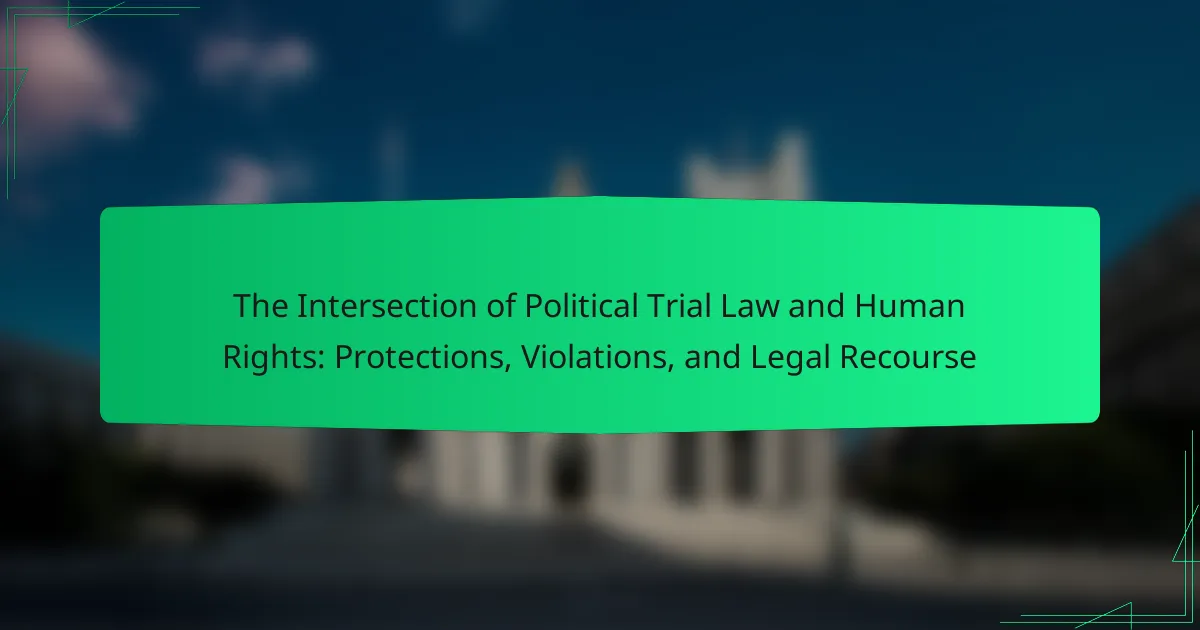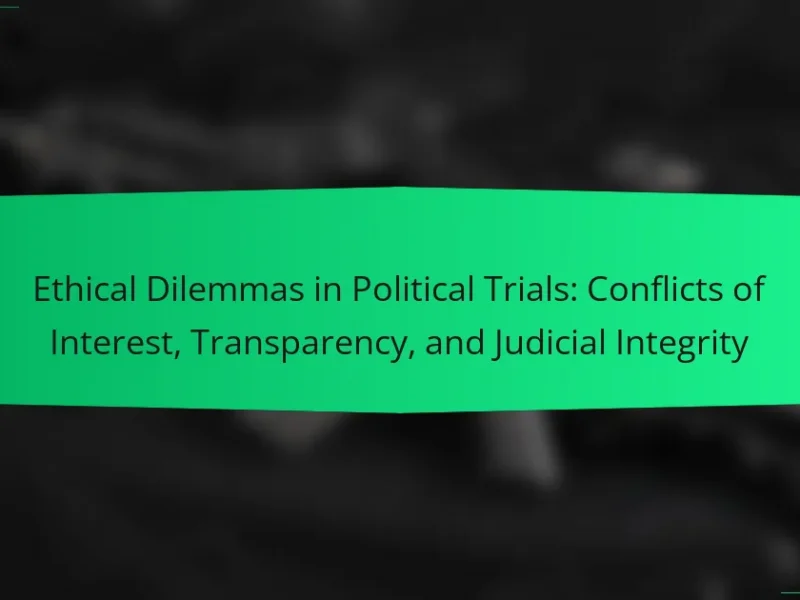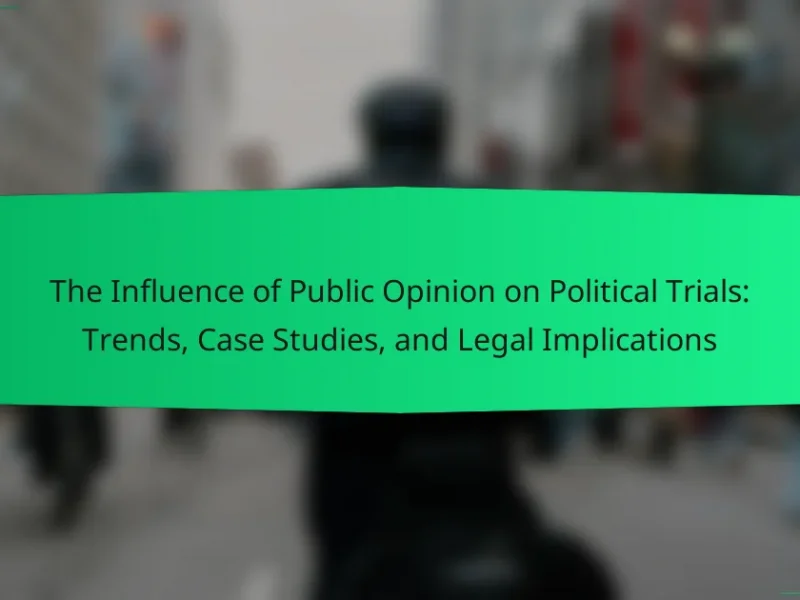The intersection of political trial law and human rights encompasses the legal frameworks governing political trials and their implications for individual rights. Political trial law deals with the prosecution of individuals based on political motivations, often resulting in charges related to dissent against the state. Human rights law outlines the fundamental rights and freedoms owed to every individual, emphasizing the right to a fair trial and protection against arbitrary detention. This article examines the violations that can occur during political trials, the legal protections available to defendants, and the various avenues for seeking justice and accountability for human rights violations. It highlights the critical need for legal systems to uphold human rights standards, even in politically sensitive cases.
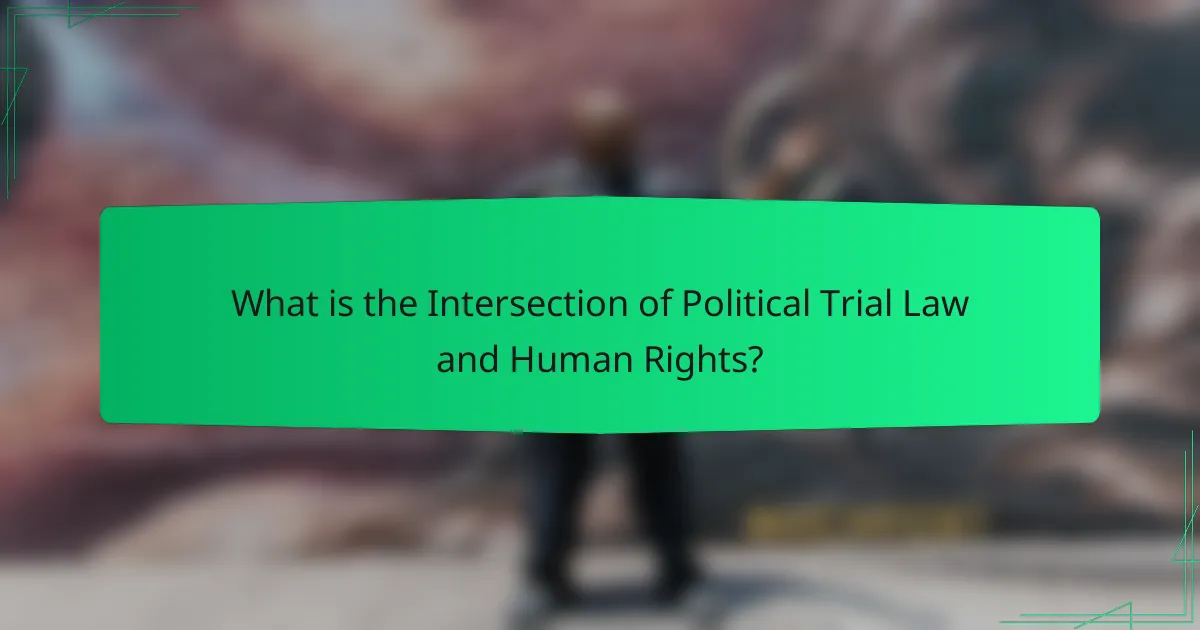
What is the Intersection of Political Trial Law and Human Rights?
The intersection of political trial law and human rights involves the legal frameworks that govern political trials and their impact on individual rights. Political trial law addresses the prosecution of individuals for political reasons, often involving charges related to dissent or opposition to the state. Human rights law, on the other hand, establishes the fundamental rights and freedoms that every individual is entitled to, regardless of their political beliefs.
In political trials, human rights may be violated through unfair legal processes, lack of due process, and arbitrary detention. For instance, international human rights treaties, such as the International Covenant on Civil and Political Rights, emphasize the right to a fair trial. Violations in political trials can lead to international condemnation and calls for accountability.
The interplay between these two areas highlights the importance of ensuring that political trials adhere to human rights standards. Legal recourse is often sought through national and international courts to challenge violations and seek justice for affected individuals. This intersection underscores the need for legal systems to protect human rights, even in politically charged cases.
How do Political Trials impact Human Rights?
Political trials significantly impact human rights by often undermining legal protections. These trials can lead to arbitrary detentions, lack of fair trials, and suppression of dissent. For example, political opponents may face charges based on fabricated evidence. This process violates fundamental rights such as freedom of expression and due process. Historical instances, like the Soviet Union’s show trials, illustrate how political motivations can override justice. Such practices create a climate of fear, discouraging individuals from exercising their rights. Additionally, international human rights organizations frequently condemn these trials for their role in perpetuating injustice. The UN has documented numerous cases where political trials have resulted in human rights abuses.
What are the defining characteristics of Political Trials?
Political trials are characterized by their focus on political motivations rather than legal principles. They often involve state actors targeting individuals for dissent or opposition. These trials frequently lack fair legal procedures and due process. Political trials can lead to severe human rights violations, including wrongful imprisonment and torture. Historical examples include the show trials in Stalinist Russia and the Nuremberg Trials. The outcomes of political trials are often predetermined, serving to reinforce the power of the state. Public opinion and international scrutiny can sometimes influence these trials. Overall, political trials undermine the integrity of the judicial system and violate fundamental human rights.
How do Political Trials differ from ordinary trials?
Political trials differ from ordinary trials primarily in their motivations and implications. Political trials are often conducted against individuals for their political beliefs or actions. These trials may lack impartiality due to government influence or bias. In contrast, ordinary trials focus on criminal or civil matters without political motivations.
Political trials frequently involve charges that are politically charged, such as treason or sedition. Ordinary trials usually address violations of law that do not involve political context. The legal standards and protections in political trials may be less stringent, leading to potential human rights violations.
Historical examples include the show trials in the Soviet Union, which were designed to eliminate political dissent. These trials often disregarded due process, unlike ordinary trials that adhere to established legal protocols. The outcomes of political trials can have significant ramifications for civil liberties and human rights.
What legal frameworks govern Political Trial Law and Human Rights?
Legal frameworks governing Political Trial Law and Human Rights include international treaties and national laws. Key documents are the International Covenant on Civil and Political Rights and the Universal Declaration of Human Rights. These frameworks establish rights related to fair trials and protection against political persecution. National constitutions and laws also play a crucial role in implementing these rights. For instance, many countries have laws that align with international standards. These legal frameworks aim to protect individuals from abuses during political trials. They ensure accountability for violations of human rights.
What international treaties protect Human Rights in political contexts?
The main international treaties that protect human rights in political contexts are the International Covenant on Civil and Political Rights (ICCPR) and the Convention against Torture and Other Cruel, Inhuman or Degrading Treatment or Punishment. The ICCPR, adopted in 1966, ensures fundamental rights such as freedom of speech, assembly, and the right to a fair trial. It obligates state parties to respect and ensure the rights of individuals within their jurisdiction. The Convention against Torture, adopted in 1984, prohibits torture and inhumane treatment, reinforcing the protection of individuals against abuses by the state. Both treaties are essential for safeguarding human rights in political contexts globally.
How do domestic laws intersect with international Human Rights standards?
Domestic laws and international human rights standards intersect through the incorporation of international norms into national legislation. Many countries ratify international treaties that obligate them to uphold specific human rights. These treaties often require domestic laws to reflect the principles outlined in international agreements. For example, the International Covenant on Civil and Political Rights mandates protections for fundamental freedoms.
When domestic laws align with international standards, they enhance legal protections for individuals. Conversely, discrepancies may arise when national laws conflict with international obligations. This can lead to challenges in enforcement and accountability. Judicial systems may reference international standards to interpret domestic laws, thereby reinforcing human rights protections.
Countries often face scrutiny from international bodies regarding their adherence to human rights commitments. Reports from organizations like Amnesty International provide evidence of such intersections. These reports highlight cases where domestic laws either support or undermine international human rights standards.
What are the common violations of Human Rights in Political Trials?
Common violations of human rights in political trials include lack of due process, arbitrary detention, and denial of a fair trial. These trials often feature biased judges and prosecutors. Defendants may face torture or inhumane treatment while in custody. Access to legal representation is frequently restricted. Evidence may be obtained through coercion or manipulation. Witnesses are often intimidated or threatened. Freedom of expression is curtailed, limiting the ability to defend oneself. International human rights standards are routinely ignored in such cases. These violations undermine the integrity of the judicial system and erode public trust.
What forms of Human Rights violations occur during Political Trials?
Human rights violations during political trials include unlawful detention, lack of fair trial rights, and torture. Unlawful detention occurs when individuals are held without proper legal justification. Fair trial rights are often violated through biased judges and lack of legal representation. Torture may be used to extract confessions or intimidate defendants. These practices undermine the integrity of the judicial process. Historical examples include the trials in authoritarian regimes where these violations were rampant. Such violations are condemned by international human rights organizations.
How do these violations affect individuals and communities?
Violations of political trial law significantly harm individuals and communities. Individuals may experience loss of freedom, emotional distress, and social stigma. Communities suffer from a breakdown of trust in legal systems and increased polarization. These violations can lead to widespread fear and decreased civic engagement. Reports indicate that communities affected by such violations often see a rise in violence and unrest. The erosion of human rights protections fosters an environment of impunity. According to the Human Rights Watch, these conditions can destabilize societies and hinder development. Ultimately, violations undermine the rule of law, affecting everyone within the community.
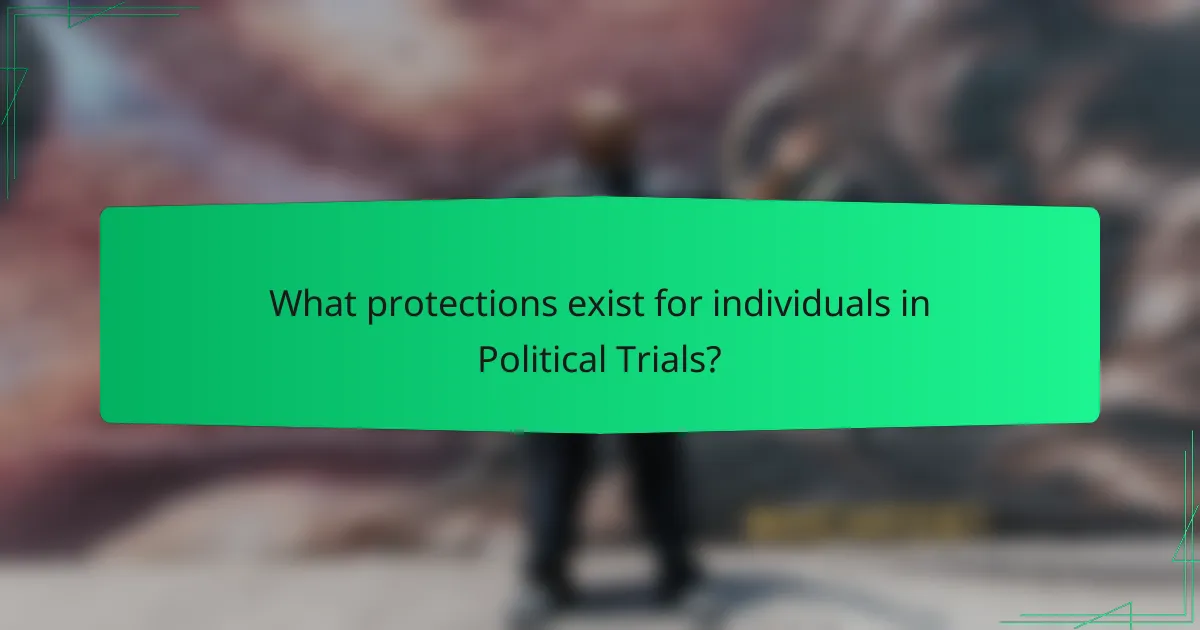
What protections exist for individuals in Political Trials?
Individuals in political trials have several protections. These include the right to a fair trial, legal representation, and the presumption of innocence. International human rights laws, such as the International Covenant on Civil and Political Rights, support these rights. Additionally, defendants can appeal verdicts and seek judicial review. They are also protected from arbitrary detention and torture. These protections aim to ensure that political trials adhere to legal standards. Violations of these protections can lead to international condemnation and legal repercussions.
How are defendants’ rights safeguarded in Political Trials?
Defendants’ rights in political trials are safeguarded through various legal mechanisms. These include the right to a fair trial, legal representation, and the presumption of innocence. International human rights treaties, such as the International Covenant on Civil and Political Rights, outline these protections. Courts often examine the fairness of the trial process and the conduct of the authorities involved. Additionally, independent oversight bodies may monitor political trials to ensure compliance with legal standards. Legal recourse is available for defendants who believe their rights have been violated. This can involve appeals to higher courts or international human rights organizations. Specific cases, such as the trial of Nelson Mandela, highlight the importance of these safeguards in maintaining justice.
What legal recourse is available for defendants facing violations?
Defendants facing violations have several legal recourse options. They can file appeals against unfavorable decisions. This process allows higher courts to review the case. Defendants may also seek post-conviction relief. This includes motions for a new trial or sentence modification. Additionally, they can pursue civil lawsuits for wrongful prosecution. Such actions can address damages incurred from violations. Legal aid organizations often assist in these processes. These organizations provide resources and representation to those in need.
How do legal protections vary across different jurisdictions?
Legal protections vary significantly across different jurisdictions. Each jurisdiction has its own set of laws and regulations governing rights and protections. For instance, some countries have robust human rights frameworks, while others may have limited protections. Legal systems may differ in their approach to political trials, influencing the rights of defendants. In jurisdictions with strong protections, defendants may have access to fair trial rights, legal representation, and appeal processes. Conversely, jurisdictions with weaker protections may lack these safeguards, leading to potential violations of human rights. The United Nations Human Rights Council emphasizes the importance of international standards in legal protections. Thus, the effectiveness of legal protections is often influenced by local laws, cultural contexts, and political climates.
What role do NGOs and international organizations play in protecting Human Rights?
NGOs and international organizations play a crucial role in protecting human rights. They monitor human rights abuses and advocate for victims. Organizations like Amnesty International and Human Rights Watch document violations globally. They raise awareness through reports and campaigns. NGOs also provide legal assistance to individuals facing human rights violations. Furthermore, they lobby governments and international bodies for policy changes. International organizations, such as the United Nations, establish human rights standards and frameworks. They facilitate dialogue between nations to promote compliance with human rights norms. Their collective efforts contribute significantly to the global human rights agenda.
How do these organizations monitor Political Trials?
Organizations monitor political trials through various methods. They employ legal observers to attend court proceedings. These observers document trial conduct and ensure adherence to legal standards. Additionally, organizations analyze court documents and public statements. They gather information from local sources and affected individuals. Reports are often published to highlight findings and advocate for transparency. Monitoring also includes utilizing technology for real-time updates. This comprehensive approach aims to uphold human rights and legal protections during trials.
What actions can they take in response to Human Rights violations?
Victims of human rights violations can take several actions to seek justice and accountability. They can report violations to relevant authorities, such as national human rights institutions or international bodies like the United Nations. Victims may also file complaints with regional human rights courts, such as the European Court of Human Rights. Engaging in advocacy through non-governmental organizations can amplify their voices and increase awareness. Legal action can be pursued in domestic courts to seek compensation or remedies. Documenting violations is crucial for building a case and supporting claims. Additionally, raising public awareness through media can pressure governments to act. These actions collectively contribute to addressing human rights violations and promoting accountability.
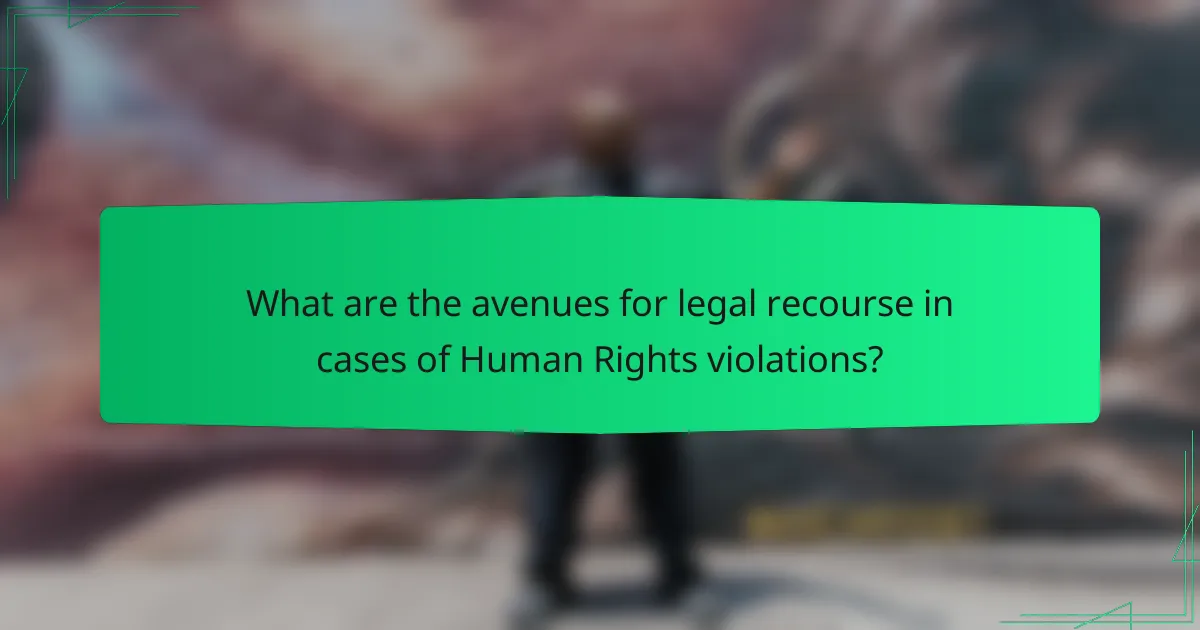
What are the avenues for legal recourse in cases of Human Rights violations?
Victims of human rights violations can seek legal recourse through various avenues. They may file complaints with national courts, which are responsible for upholding human rights laws. International courts, such as the International Criminal Court, also provide a platform for addressing severe violations. Non-governmental organizations often assist victims in navigating legal processes. Additionally, regional human rights bodies, like the European Court of Human Rights, offer mechanisms for redress. Legal aid services can support victims in pursuing their claims. National human rights institutions may investigate and recommend actions against violators. Reporting to the United Nations can also prompt international scrutiny and pressure for accountability. These avenues collectively enable victims to seek justice and remedy for violations.
How can victims of Human Rights violations seek justice?
Victims of human rights violations can seek justice through legal avenues. They may file complaints with national human rights institutions. They can also pursue cases in domestic courts. International courts, such as the International Criminal Court, offer another option. Victims should gather evidence to support their claims. Documentation of violations strengthens their case. Legal representation is crucial for navigating complex legal systems. Advocacy groups can assist victims in the process.
What are the steps involved in filing a complaint or lawsuit?
To file a complaint or lawsuit, follow these steps. First, identify the legal grounds for your complaint. This may involve violations of rights or legal obligations. Next, gather relevant evidence to support your claim. This includes documents, witness statements, and any other pertinent information. Then, draft a complaint that outlines the facts, legal basis, and the relief sought. After that, file the complaint with the appropriate court. This usually requires paying a filing fee. Once filed, serve the complaint to the defendant according to legal procedures. Finally, prepare for court proceedings, which may include discovery, settlement discussions, and trial. Each step is crucial to ensure the legal process is followed correctly.
What challenges do victims face in seeking legal recourse?
Victims face numerous challenges in seeking legal recourse. One significant challenge is the lack of access to legal representation. Many victims cannot afford lawyers or do not know how to find legal assistance. Additionally, victims may encounter intimidation from perpetrators or their associates. This intimidation can discourage them from pursuing legal action.
Another challenge is the complexity of legal procedures. Legal systems often involve intricate rules and processes that can be overwhelming for victims. Furthermore, victims may experience emotional distress, which can hinder their ability to navigate the legal system effectively.
In some cases, victims may also face bias within the legal system. This bias can manifest in the form of skepticism towards their claims or inadequate support from law enforcement. Lastly, the lengthy duration of legal proceedings can deter victims from seeking justice. Research indicates that many victims abandon their cases due to the prolonged timeline and uncertainty of outcomes.
What best practices can individuals and organizations adopt to support Human Rights in Political Trials?
Individuals and organizations can adopt several best practices to support human rights in political trials. First, they should ensure legal representation for defendants. Access to skilled legal counsel is crucial for fair trials. Second, monitoring trials for fairness is essential. Independent observers can report on trial conduct and human rights adherence. Third, raising public awareness is vital. Campaigns can inform the public about political trials and their implications. Fourth, advocating for policy changes can help. Organizations can lobby for laws that protect human rights in judicial processes. Fifth, providing support to victims is important. This can include legal aid, psychological support, and community assistance. Lastly, documenting violations is necessary. Accurate records can support future advocacy and legal actions. These practices collectively promote accountability and protect human rights during political trials.
How can advocacy improve the situation for defendants in Political Trials?
Advocacy can significantly improve the situation for defendants in political trials by providing legal support and raising awareness. Legal advocacy ensures that defendants receive fair representation and access to their rights. Organizations like Amnesty International have documented cases where advocacy has led to the release of wrongfully imprisoned individuals. Advocacy campaigns can mobilize public opinion, pressuring governments to adhere to human rights standards. This public pressure can lead to increased scrutiny of judicial processes. Furthermore, advocacy can provide resources for legal defense, improving the quality of representation. In many instances, advocacy has been instrumental in highlighting abuses and promoting reforms in political trial procedures.
What resources are available for those seeking to understand their rights?
Legal aid organizations provide resources for understanding rights. These organizations offer guidance on legal processes and rights protections. Government websites often outline citizens’ rights clearly and accessibly. Non-profit groups specialize in human rights education and advocacy. Online platforms provide legal information and resources for specific rights issues. Community centers may host workshops on rights awareness. Law libraries offer access to legal texts and resources for research. Educational institutions frequently provide courses on civil rights and legal studies.
The main entity of this article is the intersection of political trial law and human rights, which examines the legal frameworks governing political trials and their implications for individual rights. The article outlines how political trials often violate human rights through unfair legal processes, arbitrary detentions, and lack of due process, emphasizing the need for adherence to international human rights standards. Key topics include the characteristics of political trials, common violations of human rights, legal protections available to defendants, and the role of NGOs and international organizations in monitoring and advocating for justice. Additionally, it discusses the challenges victims face in seeking legal recourse and the best practices that can be adopted to support human rights in politically charged judicial contexts.
